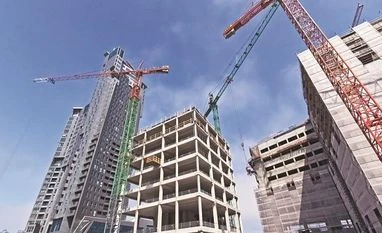After a decade of downtrend, rising investments within private corporates in industrial and household segments, bottoming out of prices, and sustained demand have brightened the outlook for the real estate sector.
Nominal gross fixed capital formation (GFCF) grew at a CAGR of 6.5 per cent between FY12-21, underperforming nominal GDP which grew at a CAGR of 9.5 per cent over the same period, data by the national accounts statistics 2022 shows. While the household sector and private corporates contributed 74 per cent to GFCF in FY21, it was down by 500 basis points (from 79 per cent) since FY12.
Moreover, contribution of real estate (dwellings, other buildings and structures) within household sector to GFCF fell from 37.4 per cent in FY12 to 25.4 per cent in FY21, while contribution of industrial sector corporates (manufacturing, utilities, commodities, construction) to GFCF fell from 21 per cent in FY12 to 14 per cent in FY21.
The brokerage's proprietary metric of aggregate 'CFO/Capex' (Cash Flow from Operation to Capex ratio) of listed India Inc. is currently at a 2-decade high of 2.1x, while PAT to GDP ratio is reaching a decadal high of 4.3 per cent.
According to Vivek Rathi, Director-Research at Knight Frank India, consumer sentiment shifted heavily towards home ownership amid the Covid-19 pandemic, which led to a strong sales momentum across price segments and geographies.
"Sales momentum has sustained even post the third coronavirus wave, which shows the sector is under a new upcycle. While there could be periods of relative under/outperformance, overall bias remains upward in both price and volume trajectory," he said.
Cost woes
That said, high input costs amid the on-going Ukraine-Russia war is a near-term overhang. According to 'National Price Rise Impact Study 2022' by CREDAI (Confederation of Real Estate Developers' Associations of India), nearly 40 per cent of real estate developers feel that they will not be able to deliver their projects if the government did not take steps to provide relief from a sharp hike in prices of construction materials.
The survey of approximately 1,900 CREDAI members, revealed that there is a direct increase of approximately 20 per cent in construction costs, which will have a direct bearing on the real estate prices. Rates are expected to rise further by 5-7 per cent, taking the total increase to 10-15 per cent across India in CY2022, the survey said.
"There is an increased pressure from input price hike in terms of intensity and the trajectory. Thus, developers are cautiously monitoring new project initiation as they don't want to end on the wrong side of cost," Rathi of Knight Frank India said.
HSBC added: We remain cautious on the sector as rise in commodity prices is putting significant pressure on input costs and if the developers don’t increase prices adequately, margins will take a hit. Moreover, we believe that sales momentum has already been priced in by the market, and gradually increasing land prices will put pressure on long-term profitability.
Investment strategy
The March quarter earnings (Q4FY22) are expected to be a strong for listed developers in terms of booking values (new and outstanding), customers closing deals in anticipation of price hikes, and pre-buying happening in Maharashtra as metro cess of 1 per cent (on property value) kicked in from April 1.
"Among the developers, DLF Ltd and Macrotech Developers have substantial ready to move (RTM) inventory which would release cash flows under the current environment and thereby remain relatively insulated from input cost inflation. We remain constructive on the residential cycle backed by high absorption / low inventory scenario and the ongoing consolidation trends," said a report by JM Financial. It prefers DLF, Macrotech Developers, and Prestige Estates.
Those at Sharekhan, meanwhile, like Mahindra Lifespaces, DLF, Oberoi Realty, and Prestige Estates, Macrotech Developers, Puravankara, and Arihant Superstructures.
Going forward, the ability of developers to show growth on a high base of FY22 sales, and management of a weak macroeconomic environment along with rising interest rates would be the key monitorables, analysts said.
So far in the current calendar year 2022, the Nifty Realty index has tumbled 7.6 per cent on the National Stock Exchange (NSE) as against a 2.2 per cent dip in the Nifty50 index.
To read the full story, Subscribe Now at just Rs 249 a month
Already a subscriber? Log in
Subscribe To BS Premium
₹249
Renews automatically
₹1699₹1999
Opt for auto renewal and save Rs. 300 Renews automatically
₹1999
What you get on BS Premium?
-
Unlock 30+ premium stories daily hand-picked by our editors, across devices on browser and app.
-
Pick your 5 favourite companies, get a daily email with all news updates on them.
Full access to our intuitive epaper - clip, save, share articles from any device; newspaper archives from 2006.
Preferential invites to Business Standard events.
Curated newsletters on markets, personal finance, policy & politics, start-ups, technology, and more.
Need More Information - write to us at assist@bsmail.in
)